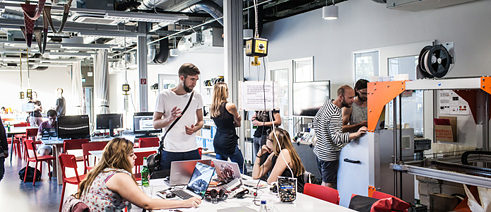The Maker Movement
Just Make It Yourself

The maker scene has grown considerably in Germany. There are even the first instances of cooperation with the government and business.
The 3D printer on the windowsill is humming gently. Three young men are engaged in quiet discussion in front of a flipchart. Further back in the room the smell of Turkish doner kebab hangs in the air – a working group is sitting together over lunch. The heady mix of creativity, curiosity, commitment and communication is almost palpable when one enters the Fab Lab, an open high-tech workshop in Berlin’s Prenzlauer Berg district. The atmosphere in the workspace of around 200 square metres is highly concentrated, yet lively at the same time – and typical of the maker scene.
This movement, which might be described as a digital version of the do-it-yourself trend, emerged in the USA, from where it quickly made its way to Europe. There is particular enthusiasm in Italy, which is where the Arduino – a programmable mini-computer that is extremely popular in the maker scene – originated. Nowadays Germany also boasts dozens of open workshops, known as maker spaces or fab labs (an abbreviation of “fabrication laboratory”). Every year sees more events, conferences and publications devoted to the trend. The biggest meetings are held in Munich, Hanover and Berlin. “Furthermore, the scene here has a particularly regional focus, with more than 15 smaller-scale maker fairs in German-speaking countries”, says Martin Laarmann, CEO of consulting firm Make Germany and one of the organizers of the Make Munich fair.
Innovations made out of textiles, light and metal
But what do makers actually do? “I interpret the term very broadly”, says Laarmann. He believes that a maker is anyone who makes something themselves. “Repair cafés” – places where neighbours get together to help each other repair old electronic devices – can certainly be seen as part of the same movement, in his view. Some makers are more interested in fashion and experiment with fabrics, while others work with light or metal. Yet others design furniture or jewellery. In addition, there are numerous boffins who are brilliant at programming and construction. They use fab labs to produce prototypes of innovative electronic products or spare parts for older models. “20 to 30 people come here every day”, explains Sam Robinson, a manager at the Fab Lab Berlin, where they take advantage of the textiles lab or woodworking shop, use the milling machine or print out their designs on one of the numerous 3D printers.In some cases makers prove to be more inventive and creative than the R&D departments of large companies, which also makes the scene of interest to big business. Many high-tech companies are very much interested in establishing contact with makers. The Federal Ministry of Education and Research (BMBF) has also recognized the scene’s potential for Germany as a location of business and science, and is therefore promoting exchange between companies and young developers. One particular focus here is on photonics, or light technology. There are great hopes that the independent developer scene will contribute ideas and impetus to this area. The approach is known as “citizen science”, where ordinary people can get directly involved in research and product development.
More than just an incubator for promising start-ups
So far, however, the dialogue between the new generation of inventors and large-scale companies is still in its infancy. As Laarmann explains, there is still fairly limited institutional funding in Germany as compared with other European countries. “We want to see the government do even more to support the scene.” After all, maker spaces can do a great deal more for public life than simply serve as an incubator for promising start-ups. They are a meeting point and promote dialogue between hackers and DIY enthusiasts, between the older and younger generations, and between local companies and future employees. “It can thus be completely worthwhile even for smaller towns to establish a fab lab.”Not all makers at the Fab Lab Berlin want to develop complex prototypes or immediately start their own business. Many simply enjoy the pleasant working atmosphere – and are happy that they have the chance to use the latest machinery for their experiments at very little cost. Democratizing production is also one of the movement’s central goals. “Some people merely want to make individual gifts”, says Sam Robinson. And of course, these makers are also welcome at any time.